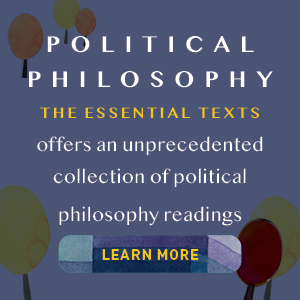Mini-Heap
Recent additions to the Heap of Links…

- “Art is artifice plus, one hopes, a hint of genius… Such hints can shine through… in the most unlikely, indeed the silliest places. There is of course no reason why AI should not also be such a place” — Justin E.H. Smith (University of Paris 7) defends AI art, sort of
- “I do not think a degenerated scholasticism is the right historical metaphor for our time and era. I think late antiquity Hellenistic philosophy is where we should see ourselves” — “We are in a syncretic age. And I believe that is why we will soon be forgot,” says Liam Kofi Bright (LSE)
- “Ethics are mostly an afterthought for… profit-driven organisations, a compliance hoop they must jump through. Tasioulas and the crew of philosophers he has assembled are arguing that ethics should be foundational” — The Times profiles Oxford’s Institute for Ethics in AI
- “Now, how does one inspect the unobservable / With tools meant to detect the world measurable?” — “Hard Problem of Consciousness” is a new catchy tune by philosophical songstress Hannah Hoffman
- Over the past 25 years, the number of students at Wake Forest increased by 40%, but the number of students majoring or minoring in philosophy increased by 300% — a profile of the philosophy program at Wake Forest touches on, among other things, its strategies for increasing enrollment
- The philosophy of comics (comic strips, comic books) — questions and comments from nine philosophers
- The do’s and don’ts of writing about women in the history of philosophy — from Sandrine Bergès (Bilkent)
Discussion welcome.
Mini-Heap posts usually appear when 7 or so new items accumulate in the Heap of Links, a collection of items from around the web that may be of interest to philosophers.
The Heap of Links consists partly of suggestions from readers; if you find something online that you think would be of interest to the philosophical community, please send it in for consideration for the Heap. Thanks!



I think number 5 is misstated. The website claims a nearly 300% increase in *graduations* with a major or minor in philosophy between 1997-1998 (17 students) and 2021-2022 (67 students), not in “the number of students majoring or minoring in philosophy.” The enrollment percentage increase is likely more than that. 🙂
I greatly appreciate Prof. Berges’ many years of important work bringing to light the lives and work of women philosophers, as well as her work on how and why we need to do so. It has been very instructive for my own growth on these matters. Still, I must admit that I left “Writing about Women in the History of Political Thought: Do’s and Don’ts” quite disappointed. I would really hope that one of the “don’ts” for doing academic work intended to bring to light someone/something which has been unjustly erased is “Don’t write as though there is only one dimension of identity upon which such injustices have relied”. The need for remembering and investigating how different axes of oppression interact with each other and are experienced in tandem has been made clear many times over in the works of Sojourner Truth, Anna Julia Cooper, Luisa Capetillo, James Baldwin, Audre Lorde, Gloria Anzaldua, Angela Davis, Kimberle Crenshaw, and more. Still, though, we only find discussion of gender in Berges’ piece and all of the women whose work is being brought to light are white. Furthermore, the scholars of their work discussed in Berges’ piece are all white.
Not only is this white feminism unjust, it so often hinders the very projects which it is being used for. In this case, awareness of race and racial oppression would be instructive since I’d imagine, e.g. some of the erasure of Olympe de Gouges work has to do with the fact that she promoted the abolition of slavery. (Of course, this should not be taken as reason to shower unqualified praise on de Gouges. She also wrote a horrifically racist condemnation of the Haitian Revolution as part of the second edition of her “L’esclavage des noirs”.) Furthermore, this more expansive and inclusive approach can keep us from drawing too hasty of conclusions. For instance, I was really taken aback when I read Prof. Berges’ last line which says “And I, for one, don’t want to… see any woman philosopher’s emotions mentioned as part of a discussion of their work.” Yes, Berges is absolutely right to condemn the unjust ways in which scholars have used misogynistic and patriarchal tropes about emotion and women philosophers’ writings. The idea that this condemnation needs to be a part of not engaging philosophers’ emotions seems very problematic, though. It’s also exactly what we’d expect from a white feminist approach to justice, which tries to tweak systems in small and moderate ways rather than the revolutionary directions needed for any kind of real justice. The divorcing of philosophy and emotion has been part and parcel of a logic of domination (cf. Karen Warren 1990) which perpetuates oppression against women, people of color, the world outside of Europe, nature, etc. In fact, I think the single most important recent work of philosophy centers emotion (for both philosophical and justice work)—Myisha Cherry’s The Case for Rage: Why Anger is Essential to Anti-Racist Struggle.
While I’m focusing on Prof. Berges’ work in this case, it’s important to note that none of this is unique to her work at all. This discussion has already been had at this very website, in the comments section of Shapiro Wins C$2.78 Million Grant for New Narratives in the History of Philosophy. We also continued it in the related episode of Dwight K. Lewis and my podcast with the late Charles Mills, Linda Martin Alcoff, and Shelley Tremain. Finally, if folx are interested in the ways in which white feminism causes issues more broadly and how to build “a radically inclusive, intersectional, and transnational approach to the fight for women’s rights”, I’d encourage reading Rafia Zakaria’s fantastic Against White Feminism.
#5 is a private institution of course. Their methodologies and pedagogies would never satisfy Student Learning Objectives or meaningfully offer transferable units to a different institution. It is a luxury to apply strategies such as a purely discussion based course where you get an A if you make the professor think something new, that us in public institutions would never be able to apply. If I could offer courses like that, of course my enrollments would go up.